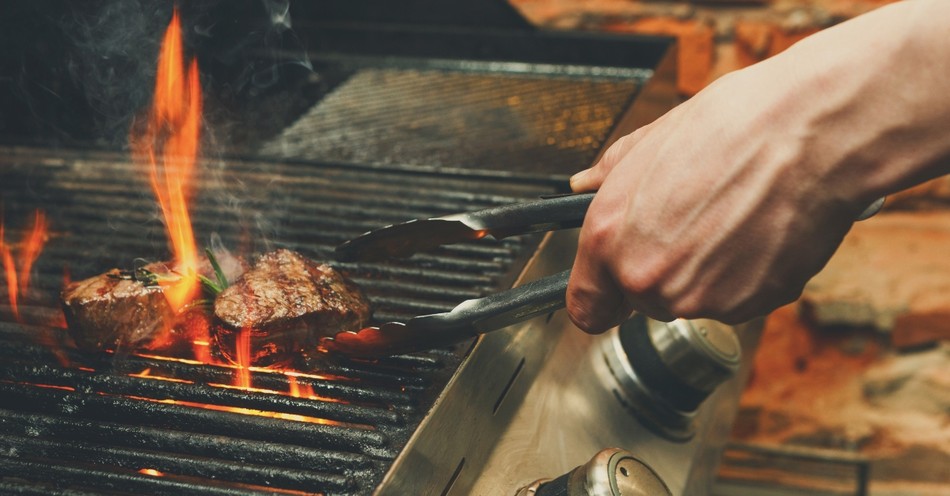Biblical guidance is something that Christians hold in high esteem. They want to live according to God’s precepts, under His guidance, and righteously. For varying reasons, some individuals have a crisis of conscience about the food they eat. Whether they wish to give up meat, eat in alignment with Jewish customs, or other personal decisions, they want to know what the Bible says about godly behavior, including whether or not meat is okay to eat.
Should people take a life if they don’t have to? Does the Levitical law apply to the church? Was man even meant to consume flesh in the first place? The Bible does address these questions, though sometimes it is indirectly.
Though humanity may not have eaten meat in the Garden of Eden, the Fall changed everything, and man’s ability to have a relationship with God was altered. To be clean before God, they had to be clean physically as well, but the blood of Jesus cleanses man thoroughly. Man’s relationship with God changed his relationship with meat.
Photo credit: ©Getty Images/Prostock-Studio

Did Adam and Eve Eat Meat in the Garden?
In the beginning, God put Adam and Eve in the Garden of Eden. They lived in innocence, naked, cultivating the earth. They spent time walking with their Creator. They had an abundance of food to eat with only one plant they could not consume; “And the Lord God commanded the man, saying, ‘You may surely eat of every tree of the garden, but of the tree of the knowledge of good and evil you shall not eat, for in the day that you eat of it you shall surely die’” (Genesis 2:16-17).
These two verses reveal a lot about the diet of the first man and woman. They could eat any fruit or vegetable, except that which grew on the tree of the knowledge of good and evil. Death had not entered the world either. Because God had not permitted them to eat animals, and they would not have thought to take the life of an animal and consume it, they did not eat meat in the Garden.
After sin entered the world, death did as well. After they ate the fruit, Adam and Eve realized they were naked, which resulted in the first recorded instance of an animal dying to support human life; “And the Lord God made for Adam and for his wife garments of skins and clothed them” (Genesis 3:21).
The Bible remains silent about what people ate between the Fall and the Flood. Once the waters receded, God clarified what people could eat. “The fear of you and the dread of you shall be upon every beast of the earth and upon every bird of the heavens, upon everything that creeps on the ground and all the fish of the sea. Into your hand they are delivered. Every moving thing that lives shall be food for you. And as I gave you the green plants, I give you everything. But you shall not eat flesh with its life, that is, its blood” (Genesis 9:2-4). Whether people ate meat before the flood and God was clarifying this was allowed, or whether they had not and God was permitting it, is not clear. This point is that God formally approves the consumption of meat, except that which was still saturated with blood.
Photo credit: ©Getty Images/olga_d

What Foods Were Forbidden?
Under the Levitical law, there were restrictions on what those who followed the God of Israel could eat. Certain foods were deemed clean and unclean. These foods were mostly outlined in the Book of Leviticus. It addresses creatures on the earth, insects, birds, and creatures of the sea.
These rules can be summarized with the following verses and examples:
Creatures on the earth: “ Whatever parts the hoof and is cloven-footed and chews the cud, among the animals, you may eat” (Leviticus 11:3).
Creatures of the sea: “These you may eat, of all that are in the waters. Everything in the waters that has fins and scales, whether in the seas or in the rivers, you may eat. But anything in the seas or the rivers that does not have fins and scales, of the swarming creatures in the waters and of the living creatures that are in the waters, is detestable to you” (Leviticus 11:9-10).
Birds of the air: “And these you shall detest among the birds; they shall not be eaten; they are detestable: the eagle, the bearded vulture, the black vulture, the kite, the falcon of any kind, every raven of any kind, the ostrich, the nighthawk, the sea gull, the hawk of any kind, the little owl, the cormorant, the short-eared owl, the barn owl, the tawny owl, the carrion vulture, the stork, the heron of any kind, the hoopoe, and the bat” (Leviticus 11:13-18).
Winged Insects: “Of them you may eat: the locust of any kind, the bald locust of any kind, the cricket of any kind, and the grasshopper of any kind. But all other winged insects that have four feet are detestable to you” (Leviticus 11:22-23).
Other restrictions include swarming things, with a few exceptions, and snakes. Many of the animals that are unclean under this system are scavengers in some way, able to survive by consuming dead animals, and many of the fish forbidden by the Law are bottom feeders. The handling of carcasses, both human and animal, is what a large portion of the cleanliness laws address.
Photo credit: ©Getty Images/Deagreez

Is It Biblical to Eat Pork?
Pork, which comes from pigs, under these restrictions would be deemed unclean. While they have the parted-hoof, it does not chew its cud, like a cow does. Chewing the cud is a process where certain animals chew their food, digest part of it, and chew some of their partially digested food. Pigs do not chew the cud and can be scavengers. Under the Levitical law, pork is not allowed. However, these restrictions are no longer applicable to those who live under the freedom in Christ.
As Gentiles began to embrace the truth of Jesus Christ as the savior of the world, questions about whether they could continue to eat what they wanted – as they had when they practiced paganism – or if they should adopt Jewish diet restrictions arose. The Apostle Peter appeared caught in the middle of this conflict, as God led him into the homes of Gentiles so they could be saved, but remained close to the Jewish Christians.
Acts records a vision God sent to Peter, “and [he] saw the heavens opened and something like a great sheet descending, being let down by its four corners upon the earth. In it were all kinds of animals and reptiles and birds of the air. And there came a voice to him: ‘Rise, Peter; kill and eat.’ But Peter said, ‘By no means, Lord; for I have never eaten anything that is common or unclean.’ And the voice came to him again a second time, ‘What God has made clean, do not call common’” (Acts 10:11-15). Peter wanted to keep to Levitical notions of clean and unclean food, but under the new Covenant of the blood of Christ, everything was made clean.
Because Jesus’ righteousness is credited to those who accept Him as their Lord and Savior, they no longer need to maintain a level of outward cleanliness to have inner righteousness, and all food, including pork, is allowed.
Photo credit: Unsplash/Wright Brand Bacon

Why Does Paul Talk about Eating Sacrificial Meat?
After Jesus died and was resurrected and ascended back to Heaven, many of His first followers were Jewish, and they had to grapple with the freedom to now eat foods centuries of tradition taught them were unclean. As the Gospel spread, many pagans began to convert to Christianity. Accepting this Jewish Messiah as their Lord and Savior transformed their lives. Many of them were used to sacrificing meat to pagan idols in temples that may have had prostitutes in them. Some of them questioned whether it was right to eat meat that had been sacrificed to pagan gods. The primarily gentile church of Corinth had this question.
“The apostle Paul responded: ‘All things are lawful,’ but not all things are helpful. ‘All things are lawful,’ but not all things build up. Let no one seek his own good, but the good of his neighbor. Eat whatever is sold in the meat market without raising any question on the ground of conscience. For ‘the earth is the Lord's, and the fullness thereof.’ If one of the unbelievers invites you to dinner and you are disposed to go, eat whatever is set before you without raising any question on the ground of conscience. But if someone says to you, ‘This has been offered in sacrifice,’ then do not eat it, for the sake of the one who informed you, and for the sake of conscience— I do not mean your conscience, but his. For why should my liberty be determined by someone else's conscience? ... So, whether you eat or drink, or whatever you do, do all to the glory of God. Give no offense to Jews or to Greeks or to the church of God” (1 Corinthians 10:23-29 & 31-32).
Paul states that it is lawful to eat anything because Christ has cleansed believers from the inside out. However, he acknowledges that Christians should be cognizant not to force those whose consciences are pricked by this idea to eat this meat, or to make them uncomfortable by doing so. He encourages them to be polite, to exercise their freedom responsibly.
He goes a step further in his letter to the church in Rome where he says, “ I know and am persuaded in the Lord Jesus that nothing is unclean in itself, but it is unclean for anyone who thinks it unclean. For if your brother is grieved by what you eat, you are no longer walking in love. By what you eat, do not destroy the one for whom Christ died” (Romans 14:14-16). If a brother in Christ does not eat meat, do not eat it in front of him or her. Paul again reinforces that Christians have freedom in Christ to eat meat, but that one’s freedom in Christ should not come at the expense of others.
Photo credit: ©Getty Images/Jack Hollingsworth

Is It Biblical to Be Vegetarian or Vegan?
When looking at what the Bible says about meat, it is clear that it is not un-Biblical to be a vegetarian and a vegan. For those who feel they do not want to participate in the meat industry, do not feel well after eating meat, or feel they should give it up for any reason, they are not violating any precepts, and are exercising their freedom in Christ to pursue a lifestyle that works best for them. It reflects the concerns the Corinthians had about eating sacrificed meat. If a Christian feels they should give up meat for health or moral reasons, they have the freedom to do so.
Ultimately, diet is an individual choice, made based on health needs and personal taste. Food exists first for nourishment, and secondarily to provide a pleasurable experience. Food is tasty, but can be a stumbling block for some people. Whether it is meat, alcohol, or sugar, there is freedom in Christ to consume it, but it should never become an idol or a stumbling block for others.
Sources
Balentine, Samuel. The Torah’s Vision of Worship. Minneapolis: Fortress Press, 1999.
Davies, Philip and John Rogerson. The Old Testament World. Louisville: Westminster John Knox Press, 2005.
Wenham, Gordon J. The Book of Leviticus. Grand Rapids: Wm. B. Eerdmans Publishing Co., 1979.
Photo credit: ©Getty Images/Povozniuk





